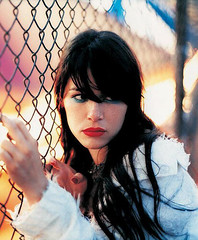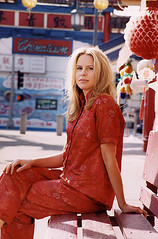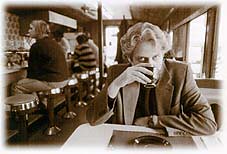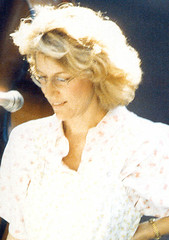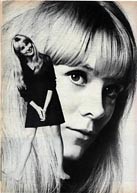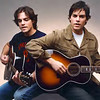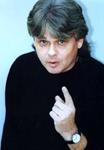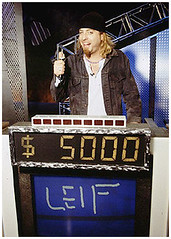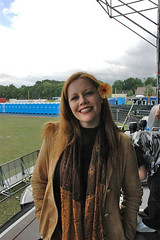 Michael McCartney remembers Barry Shannon.
Michael McCartney remembers Barry Shannon.Here it is Easter Sunday and it's been over twenty-fours since I was on the air. It was during the halfway point of the broadcast when Kathy Collins called with the news of her husband passing away. Don Lopez was standing next to me while I was setting up the next song to play on the air. Don's phone rang and it was not what I wanted to hear. I knew this time was coming and yet it was still hard to accept.
Where does one begin? Barry Shannon was a man filled with a love for life. A love and zest for life that you probably know first hand because every group of friends has that one guy or girl who embraces everything. That was Barry.
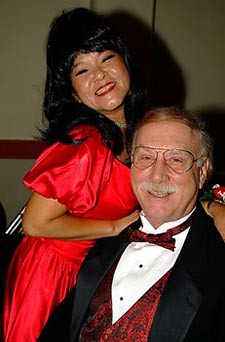
Sure...Barry and I would swap stories about our FBI files or the decline of record labels supporting and nuturing artists in the late sixties and early seventies. Talking politics often made us sound cynical but it's only because we care. Barry cared and it showed in everything he did. Mana'o Radio is just one shining example.
It was just over five years ago that KEAO hit the FM airwaves as "Mana'o Radio" on Maui and online. Like most disc jockeys, Barry had a desire to get a radio station on the air that meant something to people and would give him the vehicle to truly express himself as an announcer. Barry and I would share our FCC stories. Barry got so far forward with the filing process than I did that I had to bow down to the master. Barry's knowledge and learning some new rope techniques along the way brought his radio dream closer to reality.
"Any day now", he told me on the phone while I was doing my afternoon airshift on KONI 104.7 FM, "You've been there from the beginning. I know that you're busy but would you like to be a part of this?".
Busy? Was he kidding me? What DJ doesn't want to do whatever the heck he feels like doing on the airwaves? Clear my calender!
Of course, I was in the fortunate situation of already working for more than one broadcasting company, so adding another was not a problem.
Here comes the fun part...showing up for Mana'o Radio's debut broadcast. Our first broadcast studio was actually in Barry and Kathy's home. Where was the studio in their house? In a former teenager's bedroom. That's right. You couldn't ask for a better place than a dwelling where music of the last century has hit the hearts of music lovers. The room that you grew up in. The walls and ceiling still had stickers and assorted memories of youth that reflected that rock and roll spirt. At least in my head it did. It was a flashback to my youth when I did the same thing. Of course, my Dad wasn't too thrilled with the fact that the government would show up like a scene out of "Pump Up The Volume". Christian Slater's performance, physical appearance and wardrobe in that motion picture didn't help the situation but that's a story for another day. If I have to tell one more journalist that the movie is really about Sean "Hollywood" Hamilton's teenage years and not mine - I'm going to scream. Come on, Sean, fess up. Help a radio brother out.
Below photograph: Bedroom Broadcasting with Gail Swanson and Michael McCartney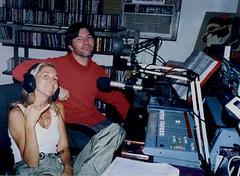
Anyway...there we all were in the first week of broadcasting from a bedroom. The audience didn't know where we were broadcasting from but they certainly found us fast. We were only on for a couple of days and you could find KEAO as background music in all sorts of business establishments from dining to clothing. It was mind blowing that an audience would find us so quickly and embrace our free form format. In addition to Barry and Kathy, behind the microphone those first few days were all DJs who no longer had a home on the airwaves especially after not one - but two rock stations vanished from Maui's airwaves. Spinning discs with joy were KAOI's Bill Best, KMVI's Kirk Hamilton, Scott Sherley and myself. Other displaced announcers came aboard over the following weeks. It was like all of us were rock and roll dinosaurs brought back to life on one radio station. Voices that filled Maui's airwaves for decades were all on the same dial position. It was ironic to Scott Sherley and myself who went from being the oldest air talents on KPMW to being the youngest announcers on KEAO. The babies that we were...ended up playing the oldest music on Mana'o Radio. Go figure. *lol
Below photograph: Kathy Collins, Barry Shannon, Michael McCartney and Scott Sherley at the Maui County Fair.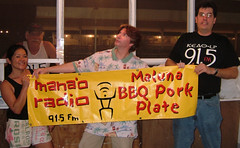
Five years later, the station has evolved into a musical animal that can't be leashed. The airstaff now consists of roughly fifty air talents. Most of the announcers are actually musicians. There are only a handful of us that have been announcers for most of our lives as a profession. This is all from a dream that began with Barry Shannon.
I have many memories of Barry. Like most Maui residents, I heard Barry on the radio. It was a blast to hear both Barry and Kathy when they got to gig on the air together. They were so funny on the air as a team. For almost twenty years, I kept asking Barry to bring back those old nuggets of comedy they produced for their radio program on FM 101 KLHI. "Someday", Barry told me, "Those bits are still on reel to reel". If you live in a digital age, that means that those comedic moments are on tape and have yet to be found in Barry's stack to be transferred to CD or even an MP3 file.
Below photograph: Mike Elf and Barry Shannon.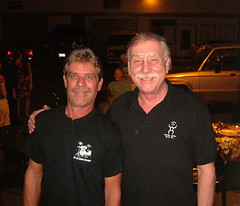
It's an odd remembrance but the image that I can never shake is when I used to work with Barry at KNUI. Maui's Rock 98.3 and 55 AM were both KMVI and where purchased by the same company that owned KNUI. I came onboard with those two stations along with Q103 getting launched. Out of all of the radio stations that I've ever worked at, this particular radio station didn't really have an area to hang out and shoot the breeze. Trust me when I say that most DJs are actually children at heart and every station that I've been at is really just a grown-up version of "Romper Room".
So where did this leave Barry to relax or blow off some steam? Outside. I have so many fond memories of talking with Barry outside of the station in the ugly back parking lot near the dumpster. Broadcasting from Hawaii, this scenario looked more urban than Maui. It was much like a television crime drama where the culprit is up to no good in the alley behind the diner. I can still see Barry with his cordless headset around his neck listening to when his record would be over before running back in. We'd be outside looking like the J.D.s or "greasers" from those fifties flicks. While growing up as a teen at Lahainaluna High School, there was a silly term for those that hung around outside the bathroom during lunch recess looking tough - "the bathroom gang" (pronounced as "da batchroom gang"). Adding to that image outside of the radio station's back parking lot was Barry's wife, Kathy Collins, taking a drag on a cigarette. You know how most people look really serious and tough while smoking a cigarette no matter how much they laugh and smile the rest of the time? That was Kathy, who now standing outside, could have easily slipped into being one of my classmates at Lahainaluna from "the bathroom gang".
Barry would spin his tales or discuss his latest fave. The wind would be blowing Kathy's hair and my tie in the cool Maui breeze under the Hawaiian sun. We'd all be laughing like it was recess in the sixth grade. Bless you Barry for making my stint a good time.
Below photograph: Barry Shannon and Kathy Collins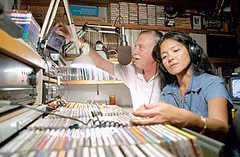
It wasn't just the fact that we shared an appreciation for artists like Randy Newman or Tom Waits but Barry loved all music. He embraced the blues and jazz more than anyone that I knew. There were many times that Barry would run into the studio all out of breath pleading to know what song did I just play on the air. Winning by a landslide, were the phone calls on the studio request line from Barry wanting to find out who did that song. He was thirteen years old again only instead of some new Elvis Presley or Miles Davis...he was craving to play that awesome newly released Ani DiFranco song or the latest Bonnie Raitt. He was all over me one day when I was playing a fifteen minute comedy cut about radio in the future. He was burning his own CD of that comedy track like a musical downloading teenage junkie.
I've only been telling you about music and radio. Barry was a man who loved the great outdoors. I regret that I never got to go on a hike with Barry as we often trekked the same paths in the valleys of Maui. He truly embraced the outdoors.
It was just a few months ago that Barry made it possible for me to get off the air and join him along with other Mana'o Radio airstaff on a whale watch with the band Astrogin. Ashley Starr from "The Time Machine" and myself enjoyed the late afternoon and sunset while humpback whales breached and took care of their calves between the islands of Kahoolawe, Lanai, Molokai and Maui. I had a wonderful time and only wish now that I had known that this would have been my last time "outside" with Barry. Before I headed off to Nevada and Arizona a few weeks ago, I was honored to have Barry host the last few radio shows before "The Time Machine" rolled in the studio. Barry had not been on the air for awhile and I suspect that he missed it. I could always count on Barry to begin "The Time Machine" with "Magic Bus" from the The Who or some fantastic cut from Steely Dan.
Barry, on behalf of; Jenny Leong, Summer Blue, Ashley Starr, Joe King and the rest of "The Time Machine" crew, I salute you for giving us the opportunity the last five years to spread our love of music and comedy. It didn't matter if we played Power Pop or Big Band music. It didn't matter if we played Heavy Metal or Singer-Songwriters. It didn't matter if we played Little Feat followed by The Osmonds and Gwen Stefani followed by Gabby Pahinui. It didn't matter that our most played artists since the station started were The Bangles and Rachael Yamagata. You let us "talk story" with musical performers, actors, comedians and authors for hours on the air. You permitted us to let artists actually perform live in the studio for as long as they wanted. Recording artists around the world and local Maui artists owe a debt to you which you never would collect. Hawaiian artists appreciate all that you have done for the music scene. We could never thank you enough.
I told Kathy last week that Barry had been around the block a number of times and yet still managed to have child like wonder. That is something that I will always find special in Barry and appreciate to this very day. He was a true friend and will be missed.
Below photograph: Barry Shannon and Kathy Collins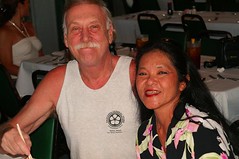
I will close out with these words from Kathy:
"And so my favorite DJ has gone to the Great Studio in the Sky. I only hope, as Rich said, that they don't use Verizon up there."
"My deepest gratitude to each and every one of you, for your comforting and inspiring messages throughout this ordeal. Thank you for showering so much love on my love."
Me ke aloha pumehana,
Kathy
The Time Machine's Joe King adds:Barry, I will remember you as a very nice person and I will miss you. Aloha to you and your family. You are a great example of how to live life and treat others.
 The Time Machine's Scott Sherley, host of; "What Were They Thinking?", "Sentimental Journey" and Mana'o Radio's "Stardust Memories":
The Time Machine's Scott Sherley, host of; "What Were They Thinking?", "Sentimental Journey" and Mana'o Radio's "Stardust Memories":Aloha Barry my old friend, by striving for your dream of Manao Radio, you made the dreams of so many listners and DJ’s come true as well. There will never be another like you and you will always be remembered.
Scott Sherley
Stardust Memories
 Recording Artist and Singer-Songwriter Gail Swanson:
Recording Artist and Singer-Songwriter Gail Swanson:I will miss Barry! He was always smiling and so cool! Sometimes when I did a Sat. show, Barry and Kathy would pop in and say hi in the middle of their busy day. They always thanked me for doing the dj gig but I hope Barry knew that I was the one who was most grateful. Grateful for getting to play my favorite songs for 4 hours. Thankful that in the midst of all conforming radio stations in the world, Manoa shined through like a real bright light of freedom. It is more than a radio station - it's a symbol of human expression and how important it is. Barry was and will always be the “DJ UPSTAIRS” and we’ll all sure miss him down here. I am sure that when we get a song stuck in our heads, it’ll be a good one from now on because Barry’s at the controls now.
No time to say goodbye
Not a word that you’d be leaving us behind
Cause you know that we’d have tried
Just to slow to down
Hold your wings and keep you on the ground
When it was time for you to fly.
One day, one way I will see you
One day, one way, I will see you again
One day, one way, I will see you my friend.
Much love to you my friend,
Gail
 Pat and Cris Simmons and Family:
Pat and Cris Simmons and Family:Growing up in the S.F. Bay Area I had the great opportunity to be around when radio went from AM to FM. KMPX was just starting out, and for those of us who were lucky enough to be part of the Psychedelic Revolution, we at last had a voice to tell the world we were here. That voice belonged to Barry Shannon. Of course there were others, Big Daddy Tom Donahue to name one, but Barry was our guy. I would never have guessed that 40+ years later I would be listening to that same incredible voice on a station that, thank God, was playing the kind of music that allowed our collective consciousness to soar. Friends come here to Maui and tune in to Manao, and are amazed to hear something so hip. They tell us how lucky we are to live in a place where we can listen to this kind of fantastic music all the time. We always smile and feel so proud of the station and all the wonderful people who make it possible. Even though we are just listeners ourselves, we somehow feel that we are a part of it. I know that is how Barry and Kathy wanted us to feel, like we were part of a family. A radio family. Whatever we happened to be doing; driving, at the beach, at a restaurant, at home having dinner, at work, or just hangin’ out with friends and family, there we were with our radio family, too. This has always brought such comfort to us, to hear the familiar voices of our friends and the tunes that we love, in the places where we live our daily lives. What an amazing gift! If this was a dream that Barry had, I would say he lived it 100 percent. There are few people who can say they have touched as many lives as this amazing man. What a wonderful legacy he has left for all of us. The music and the memories live on in our hearts. His spirit is there every time we listen to those who were close to him on the air at Manao. Thanks to all of you who carry on in his memory. Thank you so much Kathy for sharing Barry with the rest of us. Please accept our deep condolences and warm alohas.
Recording Artist and Singer-Songwriter Teri Garrison:to the radio man and his tita…
to the full tilt Einstein at the board sending signals…
doin’ things no one’s done before. brave enough to have honest radio…
foolish enough to pull it off like a 17year old on his first wave.
to the fiery dj strong enough for the job no one else would do…
wise enough to listen the truth
in between the notes…and speak it.
gentle enough to work for kokua just to make the aina smile… I say aloha… and
looking forward to your next show…I’ll be listening.
Recording Artist Vince Esquire:Being the youngest DJ at Mana’o, Barry was like a grandfather to me. I thank God for Barry’s time on earth and also believe that he’s the biggest contributor to where my career in music is heading right now. We love and miss you Barry and you can rest assure that in our hands Manao radio, your legacy, will survive and flourish beyond anything you ever could have imagined. Rest in peace my friend.
Mana'o Radio's Charles Laquidara shares on his blog:Click here for The Big Mattress Official Links:Click here for updates on the celebration of Barry Shannon's life at the official website for MANA'O RADIOClick here for MANA'O RADIO on MySpace
Official Links:Click here for updates on the celebration of Barry Shannon's life at the official website for MANA'O RADIOClick here for MANA'O RADIO on MySpace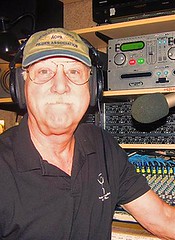 You Were A Good Friend
You Were A Good Friend
by Kenny Rogers
Composed by Kim Carnes and David Ellington
from the album "Gideon" (1980)If I closed my eyes it didn't hurt quite so bad
'cause tonight I just lost the best friend I've ever had
you were a maverick running all the way from New Orleans
we'd tell stories round the campfire late at night
when it was down to just you and me
Good friend why did you have to go?
Just when I was getting to know you
I'll sing this song to show
You were a good friend
They don't make 'em quite like you
and in my memory
You'll always be a good friend to me
You said I got a home, boy
Haven't seen it for so long
Said I'm going home, boy
My work is done
I can feel it in my bones
Good friend...
Below is an update from the
Maui News that appeared April 10th, 2007. It was reported by
Lehia Apana.
Mana’o co-founder Shannon dies at 67
By LEHIA APANA, Staff WriterWAILUKU – Beloved radio disc jockey and co-founder of Mana’o Radio Barry Shannon died Saturday in Arizona. He was 67.
Shannon was traveling last month with his wife, Kathy Collins, who was performing as her pidgin-speaking character “Tita” at the Arizona Aloha Festival in Phoenix, when he became ill and his health rapidly deteriorated. He was hospitalized for nearly two weeks before he died. Arrangements for a celebration of life are being made.
When Shannon and Collins launched Mana’o Radio at 91.5 FM in 2002 out of a spare bedroom in their Waiehu home, they figured they’d reach a couple of listeners.
Five years later, the nonprofit and commercial-free station has a cult following reaching fans in places as diverse as Cairo and Tokyo, and locations in between, thanks to the Internet streaming that Shannon took advantage of.
“Back then, we thought it would be this tiny little station that only our friends would listen to, but within a week we started getting calls from all kinds of people,” remembered Collins, who is also a disc jockey at Mana’o.
Those associated with Mana’o Radio credit its success to Shannon, who built the station from its infancy.
“He just made this thing happen from the bottom to the top, doing stuff with two cents that other stations couldn’t do with thousands of dollars,” said disc jockey Bill Best.
As its fan base grew, so did the station itself. Today Mana’o Radio has about 50 on-air personalities – all volunteers – doing live shows 24 hours a day. Its programming is varied and includes Club Mana’o, a weekly show featuring live performances in its studio in Paukukalo. In addition, the station does a remote broadcast from Casanova Italian Restaurant and Deli in Makawao each Sunday afternoon featuring acoustic music and a weekly broadcast from Unisan Sushi Bar and Grill.
“Barry and I were so grateful that the online community accepted (Mana’o Radio) so devotedly. It’s always been our baby, and now that it’s five years old, it’s passed that toddler stage,” Collins said.
Colleagues described Shannon as a pioneer figure in Maui’s radio industry, putting his heart and soul into creating a radio station that he truly believed in.
“Mana’o Radio really embodies the noncorporate and noncommercial attitude, and those were the values that defined who he was,” said Mana’o disc jockey Don Lopez.
“A lot of (disc jockeys) were pretty much being shut out of radio as it is today, which is mostly automated and computerized. There is no room for creative disc jockeys in commercial radio today, and Barry provided a home for my DJ soul when there was none,” Best added.
Lopez said Shannon’s engineering savvy coupled with his passion for music created an environment in which disc jockeys could express their creativity in a freethinking atmosphere.
“He wanted people to come up with their own programming, so they could be creative and free and do what they want. That’s really the major legacy of Barry – he made that happen,” he said.
“He was never a person who exerted his power over the other disc jockey. He chose talented people who would do a good job and just let them go,” Best added.
Lopez said Shannon always had a “sense for good radio,” noting that he would sometimes burst into the studio shouting after hearing a song for the first time.
“He’d come running into the room and he’d be so excited about hearing something brand new that he’d never heard before. It didn’t matter what kind of music it was, as long as he liked it,” Lopez said.
Lopez said he will miss sitting “knee to knee” with Shannon in the control room, swapping life stories and learning from his colleague.
“I’ll miss just talking to him. We’d talk about all kinds of stuff – engineering, technology, philosophy, writing and just life in general,” he said.
During those rare moments when Shannon was away from the radio station, he enjoyed hiking and camping in Haleakala Crater.
“One of his favorite things was to hike into the crater and camp. He would go to recharge and refocus himself spiritually,” Collins said.
Shannon also published two books inspired by his life experiences, which Collins referred to as “colorful.” He was working on his third book to complete the trilogy.
“He lived such an adventurous life and had so many true stories and crazy incidents in his head that 15 years ago he decided to write them down,” Collins explained.
Barry Flanagan of the musical group Hapa said that after hearing about Shannon’s deteriorating condition, he decided to dedicate his performance in Boston on Friday night to him.
“I fell in love with the radio station and Barry and Kathy. I so admired the fact that they were doing this thing that was just so free-form – I loved that kind of freethinking,” said Flanagan. “It’s a huge loss for their listeners, but first and foremost it’s a loss for a lot of people on a personal level. He was such a warm and wonderful guy and had that aloha spirit born in him.”
As for the future of Mana’o, “I think we all feel that the station was his baby, and we want to raise the radio baby and help it thrive in honor of Barry,” Best said.
Born March 8, 1940, in Texas, Shannon’s career in radio stemmed from his early experience in San Francisco, where he also was a private investigator and a recording engineer at Capital Records. He met Collins through his work in the Maui radio industry.
Shannon is also survived by his son, James W. Mayo, 27; his daughter, Anya Mayo, 22; and his stepson, Jimmy Beckmeyer, 29.
The photograph below was taken by Mana'o Radio's Tony Novak-Clifford during 2005's Ho'olaulea at Maui Community College. Below is a remembrance written by Rick Chatenever whose column appeared in "Maui Scene" of The Maui News on April 19th, 2007.
Below is a remembrance written by Rick Chatenever whose column appeared in "Maui Scene" of The Maui News on April 19th, 2007.MAKING THE SCENE: To the top of the hill
By RICK CHATENEVER, Scene Editor
When Mana’o Radio was just staking out its territory at 91.5 on the FM dial, the low-power station played a lot of Bob Dylan.
Perfect, I thought. Bob was – is –the Shakespeare of our age, after all. Who better than Dylan to set the tone for the feisty little station?
Fueled by hopes and dreams (as opposed to foundation grants or corporate underwriting) of its founders – husband and wife Barry Shannon and Kathy Collins –Mana’o Radio was a crazy notion from the get-go.
It was community radio that really was community radio. No commercials. No shock jocks. No NPR or college affiliation. No money.
Lots of music. Whatever anybody wanted to play. The on-air staff would be all be volunteers – longtime professionals seeking refuge from the computerized, brain-dead autopilot of the corporate airwaves to amateurs just wanting to help out.
And for moral support, there was Bob Dylan, keeper of time, prophet of change, adding his mana’o to the mix.
I finally got a chance to share my theory about Dylan’s influence on the station with Kathy Collins a few years ago. She just laughed. The reason they played so much Dylan, she said, was because that’s all they happened to have around at the station (which was in their spare bedroom) at the time.
Turns out – like with so many things, these days – I got it wrong.
The recent death of Barry Shannon provided an untimely reminder of the real soul of this amazing radio station.
As the on-air staff has observed lately, Kathy is its heart. Barry was its everything else.
Like a stone dropped in still water, the consequences of his loss are still rippling through Maui. One DJ after another recalls Barry’s infectious spirit, his enthusiasm, a creative appetite for living life–not to mention the technical genius to get it wired and keep it working.
Did I mention the part about no money?
Through the years, I would receive periodic phone calls from him. This was really it, he would say. The credit cards were maxed out. The phone company providing their satellite link was useless. He’d rather go write another book.
Idle threats. There was no way he wasn’t going to keep Mana’o Radio happening.
In addition to just staying on the air, it has produced a lot of music on its own. Live music from the studio. Remote concert broadcasts from Casanova and Charley’s. The amazing MCC “Ho’olaulea” simulcast a few years ago.
The list goes on and on. Mana’o has evolved from merely being media to become source.
Besides providing countless moments of perfect accompaniment for whatever was happening in the windshield, the station did something more. It brought people together. It used soundwaves to create community. With Barry and Kathy as parents, it became family – not only for the volunteers but the listeners.
Like a quantum physicist of rock ’n’ roll, Bob Dylan knew from the beginning, that the story was always about time. He still had peach fuzz on his face when he wrote that the times were changing. Still in his 20s, he wrote, “I was so much older then, I’m younger than that now.”
Later he penned “Forever Young,” a transcendent anthem that would itself become immortal, a heartbreaking marker of all those lives senselessly lost in Virginia this week? Or a tribute to the legacy of Barry Shannon.
Now that Dylan has finally grown into his crusty voice, he’s looking at time from the other end. And while Mana’o Radio plays music from all times and all places, Bob is still the voice of the station’s core listeners.
As our hair grays and our kids and grandkids take our places center stage, it’s telling that we still define ourselves in terms forever young. We were flower children once upon a time. Now it’s baby boomers.
“She says, Look out, daddy, don’t want you to tear your pants ? you could get wrecked in this dance. They say whisky’ll kill you, but I don’t think it will ? I’m ridin’ with you to the top of the hill,“ sings Bob on his latest CD.
Life has always been about time.
Barry Shannon beat us to the finish line.
He ran a great race.
A celebration of the life of Barry Shannon will take place on the events lawn of the Maui Arts & Cultural Center from 2 to 4 p.m. Sunday.
Below is from Tom Stevens who wrote in his "Shave Ice" column that appeared in The Maui News on April 25th, 2007.SHAVE ICE
By TOM STEVENS, For The Maui News
He was a master of timing, and he knew when to end his sets.
– Kathy Collins
And in the end, the love you take is equal to the love you make.
– The Beatles
On a hot, bright, windy Sunday afternoon, a couple of hundred Mauians gathered outdoors to remember a man who spent much of his working life indoors.
“A dimmer, smokier venue might be more appropriate,” I suggested. “This is radio, after all.“
On the car radio, the weekly “Stardust Memories” program was in its last set. In an ironic flourish that would have amused the day’s honoree, Sammy Davis Jr. sang, “Don’t Talk About Me When I’m Gone.”
Our destination was a grassy courtyard at the Maui Arts & Cultural Center. There we planned to pay our respects to the last remains of longtime Maui radio personality Barry Shannon.
But the last remains weren’t there.
“He’s wandering around the United States with the postal service,” quipped comedienne Kathy Collins, Shannon’s wife and partner. “Knowing Barry, he probably figured out how to work in a side trip.”
It was while traveling – accompanying Collins to a recent Hawaiian music and storytelling event in Arizona – that heart failure claimed Barry Shannon, aka James Barry Mayo. He was 67.
“Radio announcer and engineer, private investigator, sailor, novelist, pilot, karate instructor, husband, father and lover of life,” Collins enumerated in her eulogy. “He told me he had lived longer than he expected, and better than he deserved.”
As Collins segued from one amazing episode to another, we learned that Shannon grew up in Port Arthur, Texas, a town today remembered as the birthplace of 1960s blues singer Janis Joplin. By the time he was 14, Collins related, Shannon had read the family encyclopedia from A to Z, was building his own radio sets, and was surreptitiously crossing the border into Louisiana.
“He’d sneak into black juke joints to hear what he called ’real music,’ and he’d be the only white face in the club,” Collins said. “That’s where he developed his passion for jazz, blues and R. Then, back at home, he’d hear sanitized versions of the same music by white artists.”
At 16, Shannon landed the first of many radio jobs that would take him from Texas to California and finally to Maui. A San Francisco residency in the eventful 1960s and ’70s included a private investigator stint that inspired Shannon’s noir underworld trilogy, “The Bold Stroke,” “The Sly Pass” and “Ace in the Hole.”
As a deejay with San Francisco FM beacons like KMPX and KJAZ, Collins related, Shannon had a backstage pass for some of the most exciting music being made in America. He knew psychedelic superstars Janis Joplin, Jimi Hendrix and Jerry Garcia, and also met many jazz greats. Just being in the city in those years meant interfacing with the great swirling kaleidoscope of beats, hippies, poets, diggers, visionaries, activists, cultists, hustlers, gurus and shamans.
In 1966, Shannon made his first visit to Maui, eventually settling on the island and becoming a familiar and inspiring presence on its airwaves. Various speakers at Sunday’s memorial service recalled Shannon as a “true experiential teller of tales,” “a Renaissance man’s man,” and co-founder of “the coolest radio station in America.”
That station is KEAO (“Mana’o”) public radio, which Collins termed Shannon’s crowning professional achievement. In a five-year burst of energy and creativity, Shannon and his partners secured a rare “low-power” 100-watt FCC license, built a station, moved it two or three times, and finally had it broadcasting around the clock with a willing but wildly improbable staff of volunteer deejays. Along the way, Shannon became patron and impresario for poets, actors, storytellers, kodo drummers, bagpipers, blues bands, doo-wop singers, and any other communicators wanting to share their mana’o.
As one of those wildly improbable deejays, I didn’t take the mic on Sunday, but I will now. When I think in future of Barry, I’ll remember his warmth, generosity, talent, honesty and vision; his big voice, his passion for music and broadcasting; his unfeigned interest in other people.
I’ll also recall that he loved to share a glass and a good story, showcase new talent, hear new music or new combinations of old music, and launch legendary musical events on a wing and a prayer.
Mostly, though, I’ll really miss running into him. It was such a pleasure conversing with someone so wise, wry, thoughtful and knowledgeable. When you talked with Barry, you knew he had those encyclopedias covered, from A all the way to Z.
Thanks, Barry, and bon voyage.
Below is a story that appeared in The Maui Time before the birth of Mana'o Radio written by the late Stevie Sparks.Savoring the Implications of “The Bold Stroke”
Reflections on Maui author Barry Shannon
By “Stevie Guitar” Sparks
As I sit down to write this, Barry Shannon is somewhere in Haleakala Crater. He’s got good weather too - best in a while. Lucky guy. Seems like we all used to go into the Crater regularly, but that was then…and Barry’s there right now. He’s up there for six days this time.
In our lives, there are occasionally “figures” - people we admire for who they are, where they’ve been, and how they have dealt with what fate has offered them. For Barry Shannon, life is just beginning to get interesting.
Barry came of age in Texas, near Port Arthur, where he knew Janis Joplin, whose cousin Ruth was a neighbor. He got into radio broadcasting in Austin, while attending The University of Texas. The station he worked for is now KLBJ, the prominent rock station–which recently held a private, week-long convention here with The Arc Angels (Stevie Ray Vaughan’s Rhythm Section, etc.) and other hot Texas bands.
The muse seems to have followed him to Santa Rosa, California–in the wine country–where, while working a live jazz show in the early ‘60’s, San Francisco music critic Ralph Gleason heard his act and introduced him to The City, and the folks at KJAZ. Gleason was actually driving the freeway after teaching a class at Sonoma State, pulled off to a pay phone, and called Barry live on the air, saying what a great show he was running. Barry calls it “being available to fate”.
In San Francisco, Barry was the only white guy on the first jazz radio station in America. I mean, this is just the stuff that interests me–I wonder what stories he would tell you if you were to ask him!
Some of them might be in his debut novel–”The Bold Stroke”, which is currently rushing up lists on the mainland, and one reason he’s back in The Crater for a stroll. He’s gotta deliver the next volume by May, so don’t call him at home - call his agent. No, better yet, visit his website: www.mauigateway.com/~kcbs.
Which brings me to Precept #73: “Never Tell Anyone Everything”.Barry’s book is “A recommended noir/hardboiled/techno thriller, for fans of Kinky Friedman or Hunter Thompson”, says Booklist; and “A thrilling, exuberant ride by a master storyteller… The Bold Stroke will make you sweat, grin and laugh out loud.”–says his publicist. I say this is a damn good book. Not for the kids, but all of the above and more. I had the pleasure of reading ‘The Bold Stroke’ on The Outer Banks of North Carolina, during a balmy Thanksgiving ‘99. With Barry I visited San Francisco, Southeast Asia, Miami, Columbia, and lots of other interesting places and people, during the early 1970’s. I could smell it and taste it… and I wanted it.
But back to our story.
After his stint in San Francisco, with KJAZ, at the end of the “beat” era (Kerouac, Snyder, Ginsberg, etc), our hero arrived for the first time in Maui, in 1965, to, as he says: “let my persona rest - I was suffering from ‘persona fatigue’. And, you know, at that time, there were less than 50 (non-local) haoles on this island. We all knew each other. Those were the days when it would take you three days to hitch-hike anywhere, because everyone who picked you up would take you home and feed you first.” He worked for KMVI - “The Voice of the Plantation”, with Cliff Arquette.
When he returned to The City, “healed and happening”, in 1966, he says - “I had the best seat in the house for the greatest show on earth: The Rock & Roll Ballroom Scene. Ken Kesey’s Acid Test at The Longshoreman’s Hall, with The Butterfield/ Bloomfield/Bishop Blues Band–that was the defining moment. It was all legal then. I got back into radio and… I drank deeply from the well.”
He was there for “The Great Human Be-In” of January 1967, working The San Francisco Laugh-A-Thon and becoming chief engineer/program director at KMPX - “The Rock & Roll Voice of The Revolution”. Anyone who wanted airplay, or promotion for their Ballroom Dance gigs and concerts (Fillmore/Avalon, etc), necessarily first made sure Barry was happy. He knew all the bands, saw all the shows, and heard all the music first. He did non-stop live recordings of performances at The Fillmore West. Barry says it was all about “the people who were there that day - whoever was there, they were in the band! The ‘first band’ was The Charlatans, with Dan Hicks. They came up to play The Red Dog Saloon in Virginia City, and then Chet Helms took ‘em down to The City for a concert, calling his production company ‘The Family Dog’. The (Grateful) Dead were ‘The Warlocks’ then - Quicksilver (Messenger Service) was ‘Vulcan’… they were ‘family’ bands, there was no real money in it–they were just playin’ to get high.”
He of course would see his former compatriot Janis on the scene, with her ‘family’ - Barry recalls that they were all at her wake when the news came in that Hendrix had departed for universes unknown. He recounts: “Eric Burdon sang ‘It started at Monterey’… well, it ended at Monterey (Pop Festival). ‘The Summer Of Love’ - L.A. Record Company money coming in… people dying. And then Altamont.”
Barry came back to Hawai`i in 1969, where he sailed bands such as The Dead and Quicksilver around the islands on ‘The Porpoise’, with Paul Willeford and Jim Murray. They produced the live Quicksilver album, and lots more stuff, before our hero went back for one more round in The City. KMPX had been subjugated by a corporate takeover, and Barry went to work for a former partner’s law firm, eventually investigating files, and getting his private investigator’s license. Clients included George Mascone, Marty Feldman, Maya Angelou, The S.F. Examiner and The Hell’s Angels.
This is where we rejoin ‘The Bold Stroke’, as pivotal character (“he’s always there”) Revelations St. Jones is “savoring the implications of the arrival of the black Lincoln limo at the curb downstairs. From his desk at the bay window, he had a view of the street below the older, Russian Hill apartment building and had watched the long, sleek car cruise by earlier. He had been apprehensive all evening and was having trouble concentrating on the report he was writing and when the bell rang from the lobby entrance downstairs, it seemed inevitable, like the sound of one shoe dropping. He went to the intercom panel by the door and, salivating slightly, asked who it was. ‘Delivery for St. Jones’.”
The Private Investigator is about to get swept into an amazing and graphic adventure, woven for us by a man who got very good at writing reports. Barry says: “In our business, you knew that, at any time, you could be called before the court to testify regarding a report you had written. So your writing had to be very concise and free of fantasy, because you were accountable.” The book is the first in what will ultimately be a series of three compilations on the adventures of St. Jones - ‘The Bold Stroke’, ‘The Sly Pass’, and ‘The Ace In The Hole’: “There were these characters that wouldn’t leave me alone - stories I couldn’t forget. I just sat down a few years ago and started writing a list. I had 100 characters the first day - unforgettable characters. You can’t make this stuff up. A lot of the book is just events as they occurred–in somebody’s life.”
Later in his story: “St. Jones poured himself a JD from two airline bottles and made Girl’s drink. He sat down on one of the barstools and took a deep sip from his glass and retrieved the half-ounce of coke from his right sock. Taking off his shoes and socks, he took the drinks to the bedside table and crawled up onto the bed. St. Jones preferred the bed for hanging out. Especially in hotels. It was the closest thing to home. He made a pile of pillows and leaned back as the door opened and Girl walked out of the bathroom naked, smiling slyly as she crossed the room.”
Learning to tie it all together, and make a story out of it, was the trick: “The mechanism of a story - that is the thing. Hemingway bet a friend that he could write a novel in six words. He wrote: ‘For sale. Baby shoes. Never used.’ It’s the story, stupid! I made every mistake there is. It’s cool to over-write. Let it flow. Get it down in the third person, move it to the first person and then back to the third. It becomes a narrative of the main character - then you do a merciless edit. You gotta learn as you go. It’s kinda fun. Have a glass of wine and just write down the stories.”
Barry’s technical wizardry - from being a radio engineer/jock (in the days when guys really had to work the station to be on the air), a recording engineer, a pilot and a P.I. - bleeds beautifully into his tale: “They could see the Florida coast a hundred miles out. St. Jones began a 300 feet per minute descent, matching the beard plane. As they approached the ADIZ Air Defense Identification Zone, they heard Jackson contact Miami Approach and announce his intentions, thereby averting an escort of F-14s out of Mc Dill. They cleared the coast going through 7,000 feet. The magic trick was working again.”
“Precept 33: ‘A man’s got to know his limitations’.”At the 1992 Maui Writer’s Conference, things came more into focus when Barry attended a seminar by author/educator Elizabeth Engstrom. “She’s very good”. Barry soon finished ‘The Bold Stroke’, but didn’t hear back from his enthusiastic new agent for five years. “The publishing houses were all owned by the same people, and all they were printing were celebrity novels, self-help books and millionaire manuals”. When the agent did call back, it was good news. Barry is about to go on a national tour, responding to favorable sales with appearances in city bookstores up and down the east coast and back toward home. Get the book at Waldenbooks, Amazon.com, and Barnes & Noble or Borders on-line (for some un-explainable reason buyers have been turned away from the local Borders, being told it’s not available - never heard of it. Oh, well… try again.) They will also ship it overnight from his website.
All this and I still haven’t told you how most people in Maui know Barry and his wife, Kathy Collins: they were the in-imitable and incredible prime-time duo on KNUI - AM 900 radio for five years (‘93 to ‘98), delivering an all-but-obsolete style of quick-witted live radio, that was always informative and refreshing, and sometimes downright hilarious. “We were like a wreck on the highway - you couldn’t help but listen”. Kathy is back on KNUI in the afternoon, but Barry has decided to stay home and write. After years of public service, as a Master of Ceremonies for community events, a martial arts instructor, and an advocate for Maui’s youth, he feels now that he is getting out of the game at the right time. “Radio is not what it used to be - it’s all corporate and programmed from the mainland now, except of course KPOA. I’m content to stay in the community and enjoy my writing. I feel safe here. Maui is a sensual experience - it’s a shift from your mind to your body, when you come here from the mainland.”
Barry’s body and mind are still somewhere up there inside that mountain tonight. He says that after a few days in the deep silence of the mountain, the voices die down and he’s just there - clear and honest with himself, the sky and the earth. He says he needs that every couple of months, to stay sane. But what about the monsters?
“Precept 74: ‘You can check out any time you like, but you can never leave’.”Space doesn’t allow me to explore the soul of Barry Shannon any more, but there are plenty of good stories in ‘The Bold Stroke’, and more to come in ‘The Sly Pass’, and ‘The Ace In The Hole’. I feel lucky to have known Barry since my early days in Maui, and to have heard some of his stories first-hand. He says: “Every year there are more stools vacant at the bar”, as he immortalizes some of the characters he’s been there with, for us to contemplate... and savor the implications of.
“Precept 39: ‘If you sit by the river long enough, you will see the bodies of all your enemies float by’.”The by-line in Barry’s book says that the author “lives in a far away place with a strange sounding name”. We won’t say just where his home is, in case all of his enemies are not yet afloat, but it will be our little secret that he’s a Maui boy, and one of my heroes.
Labels: Barry Shannon, Hawaii, internet radio, Kathy Collins, KEAO, Mana'o Radio, Maui, Michael McCartney, radio








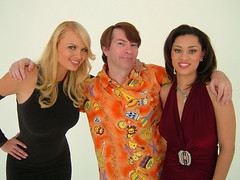
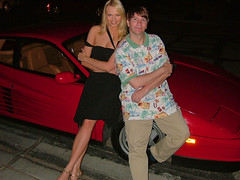
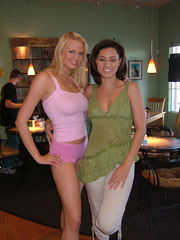
















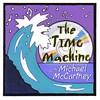

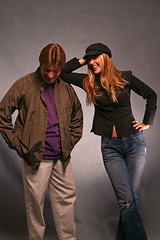
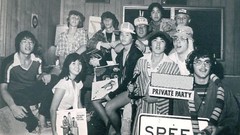
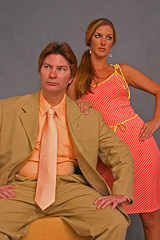

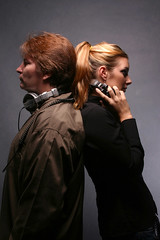

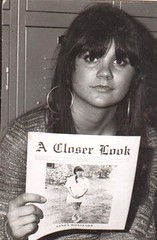
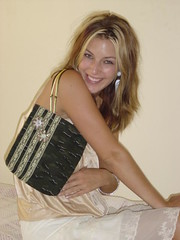
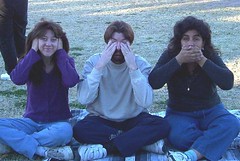






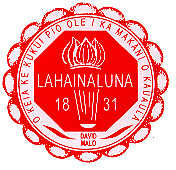
 ">
">